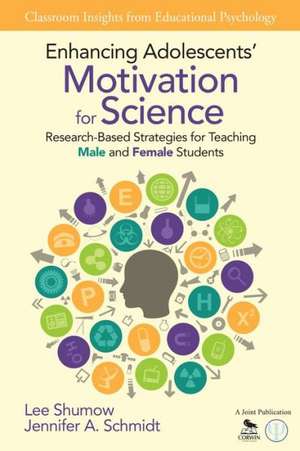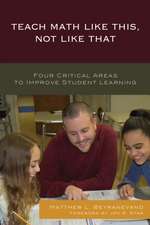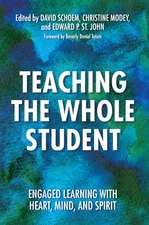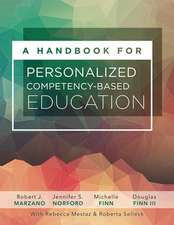Enhancing Adolescents' Motivation for Science: Research-Based Strategies for Teaching Male and Female Students
Autor Lee B. Shumow, Jennifer A. Schmidten Limba Engleză Paperback – 10 dec 2013
At the heart of Enhancing Adolescents’ Motivation for Science is a collection of research-proven strategies on how best to motivate students in science—and once students are motivated, scientific literacy soon follows. Across chapters, Shumow and Schmidt:
• Detail key motivational constructs specific to science with illustrative vignettes
• Address gender differences that influence how girls and boys are motivated
• Describe how to make science learning relevant, accessible, and enjoyable
• Reduce science anxiety and build student confidence, especially among girls
• Offer motivational strategies that are consistent with the Next Generation Science Standards (NGSS)
Much more than a professional book, Enhancing Adolescents’ Motivation for Science also includes a companion website packed with video clips, links, and tutorials. All in all, there’s no better resource for fuelling the student motivation so central to science literacy.
Preț: 225.68 lei
Nou
Puncte Express: 339
Preț estimativ în valută:
43.19€ • 46.90$ • 36.28£
43.19€ • 46.90$ • 36.28£
Carte tipărită la comandă
Livrare economică 23 aprilie-07 mai
Preluare comenzi: 021 569.72.76
Specificații
ISBN-13: 9781452269696
ISBN-10: 1452269696
Pagini: 200
Ilustrații: illustrations
Dimensiuni: 152 x 229 x 12 mm
Greutate: 0.32 kg
Ediția:1
Editura: SAGE Publications
Colecția Corwin
Locul publicării:Thousand Oaks, United States
ISBN-10: 1452269696
Pagini: 200
Ilustrații: illustrations
Dimensiuni: 152 x 229 x 12 mm
Greutate: 0.32 kg
Ediția:1
Editura: SAGE Publications
Colecția Corwin
Locul publicării:Thousand Oaks, United States
Recenzii
“I was drawn into this book. I thought I was a motivating science teacher, but as I read, I saw new insights into my own classroom and my own students. I couldn’t wait to infuse ideas from the text into my everyday interactions with my students, especially the female students. My next step is to encourage my co-teachers to form a book study so that together we can create a positive force for supporting all students in STEM classrooms and choices for the future.”
“The book contains excellent strategies to motivate students in the classroom, along with resources that are useful to classroom teachers. After reading the chapters, teachers will be able to carry out the strategies in their classrooms the next day.”
“This book is one that every teacher would benefit from reading. There aren’t many other books out there that specifically deal with some of the issues in this book. It’s an easy read and provides teachers with follow-up materials or references.”
“If you want to help your students succeed in science and could use some help achieving this goal, this book is for you. It is practical, driven by research and has something for every science teacher to use.”
The authors effectively combined different topics to create a master plan on how to run a science classroom. After reading this important book, readers likely will conclude that science in the classroom is due a revival, and bringing it back begins with our nation’s youth. This book is a must-have on every teacher’s bookshelf.
“The book contains excellent strategies to motivate students in the classroom, along with resources that are useful to classroom teachers. After reading the chapters, teachers will be able to carry out the strategies in their classrooms the next day.”
“This book is one that every teacher would benefit from reading. There aren’t many other books out there that specifically deal with some of the issues in this book. It’s an easy read and provides teachers with follow-up materials or references.”
“If you want to help your students succeed in science and could use some help achieving this goal, this book is for you. It is practical, driven by research and has something for every science teacher to use.”
The authors effectively combined different topics to create a master plan on how to run a science classroom. After reading this important book, readers likely will conclude that science in the classroom is due a revival, and bringing it back begins with our nation’s youth. This book is a must-have on every teacher’s bookshelf.
Cuprins
List of Tables and Figures
Foreword
Series Preface to Classroom Insights
Preface
Acknowledgments
About the Authors
1. Introduction: Motivation to Learn Science
The SciMo Project
How Time Was Used in Classrooms
The Student Perspective on High-School Science Classes
Gender Differences in Student Motivation and Perspective
The Experience of Boys and Girls in Science
Gender and Teacher-Student Interaction
The Importance of Promoting Gender Equity in Science
What Resources Can Science Teachers Use to Get More Background Information?
2. Value
What Does it Mean to Value Science?
Why Is Valuing Science Important?
What Have Researchers Discovered About Valuing Science in Classrooms?
How Can Teachers Foster Value?
What Resources Can Science Teachers Use to Promote Value?
3. Affiliation
What Do Classroom Social Relationships Include in High School?
Why Are Classroom Social Relationships Important?
What Have Researchers Discovered About Classroom Relationships in Science?
How Can Teachers Build Positive Relationships With and Among Their Students?
What Resources Can Science Teachers Use to Understand and Build Positive Relationships?
4. Autonomy
What is Autonomy?
Why is Autonomy Important?
What Have Researchers Discovered About Autonomy in Science Classrooms?
How Can Teachers Foster Autonomy?
What Resources Are Available to Science Teachers for Promoting Student Autonomy?
5. Confidence
What Does Having Confidence for Science Mean?
Why Is Confidence Important?
What Have Researchers Discovered About Confidence?
How Can Teachers Build Student Confidence?
What Resources Can Science Teachers Use to Promote Confidence?
6. Success
Defining the Motivational Concept of Success
Why is Success an Important Motivational Concept?
What Have Researchers Discovered About Success in Science Classrooms?
How Can Teachers Promote Student Success and Encourage Motivating Attributions?
What Resources Can Science Teachers Use to Promote Success?
7. Goal Orientation
What is Goal Orientation?
Why is Goal Orientation Important?
What Have Researchers Discovered About Goals in Science Classrooms?
How Can Teachers Apply Goal Theory?
What Resources Can Science Teachers Use to Foster Adaptive Goal Orientations?
8. Ability Beliefs
What Are Ability Beliefs?
Why Are Ability Beliefs Important?
What Have Researchers Discovered About Ability Beliefs in Science Classrooms?
How Can Teachers Foster Ability Beliefs Conducive to Success in Science?
What Resources Can Science Teachers Use to Understand and Promote Growth Mindset, and Reduce Stereotype Threat?
9. Challenge
What is Challenge?
Why is Challenge Important?
What Have Researchers Discovered About Challenge in Science Classrooms?
How Can Teachers Provide Appropriate Challenges for their Students?
What Resources Can Science Teachers Use to Promote Positive Challenge?
10. Emotion
What Emotions Are Likely to Impact Motivation in Science?
Why Are Student Emotions Important for High School Science Teachers to Consider?
What Have Researchers Discovered About Student Emotion in Science Class?
How Can Teachers Enhance Enjoyment and Teach Coping Skills?
What Resources Can Science Teachers Use to Promote Enjoyment and Decrease Anxiety?
Appendix
Methodology of the SciMo Study
References
Index
Foreword
Series Preface to Classroom Insights
Preface
Acknowledgments
About the Authors
1. Introduction: Motivation to Learn Science
The SciMo Project
How Time Was Used in Classrooms
The Student Perspective on High-School Science Classes
Gender Differences in Student Motivation and Perspective
The Experience of Boys and Girls in Science
Gender and Teacher-Student Interaction
The Importance of Promoting Gender Equity in Science
What Resources Can Science Teachers Use to Get More Background Information?
2. Value
What Does it Mean to Value Science?
Why Is Valuing Science Important?
What Have Researchers Discovered About Valuing Science in Classrooms?
How Can Teachers Foster Value?
What Resources Can Science Teachers Use to Promote Value?
3. Affiliation
What Do Classroom Social Relationships Include in High School?
Why Are Classroom Social Relationships Important?
What Have Researchers Discovered About Classroom Relationships in Science?
How Can Teachers Build Positive Relationships With and Among Their Students?
What Resources Can Science Teachers Use to Understand and Build Positive Relationships?
4. Autonomy
What is Autonomy?
Why is Autonomy Important?
What Have Researchers Discovered About Autonomy in Science Classrooms?
How Can Teachers Foster Autonomy?
What Resources Are Available to Science Teachers for Promoting Student Autonomy?
5. Confidence
What Does Having Confidence for Science Mean?
Why Is Confidence Important?
What Have Researchers Discovered About Confidence?
How Can Teachers Build Student Confidence?
What Resources Can Science Teachers Use to Promote Confidence?
6. Success
Defining the Motivational Concept of Success
Why is Success an Important Motivational Concept?
What Have Researchers Discovered About Success in Science Classrooms?
How Can Teachers Promote Student Success and Encourage Motivating Attributions?
What Resources Can Science Teachers Use to Promote Success?
7. Goal Orientation
What is Goal Orientation?
Why is Goal Orientation Important?
What Have Researchers Discovered About Goals in Science Classrooms?
How Can Teachers Apply Goal Theory?
What Resources Can Science Teachers Use to Foster Adaptive Goal Orientations?
8. Ability Beliefs
What Are Ability Beliefs?
Why Are Ability Beliefs Important?
What Have Researchers Discovered About Ability Beliefs in Science Classrooms?
How Can Teachers Foster Ability Beliefs Conducive to Success in Science?
What Resources Can Science Teachers Use to Understand and Promote Growth Mindset, and Reduce Stereotype Threat?
9. Challenge
What is Challenge?
Why is Challenge Important?
What Have Researchers Discovered About Challenge in Science Classrooms?
How Can Teachers Provide Appropriate Challenges for their Students?
What Resources Can Science Teachers Use to Promote Positive Challenge?
10. Emotion
What Emotions Are Likely to Impact Motivation in Science?
Why Are Student Emotions Important for High School Science Teachers to Consider?
What Have Researchers Discovered About Student Emotion in Science Class?
How Can Teachers Enhance Enjoyment and Teach Coping Skills?
What Resources Can Science Teachers Use to Promote Enjoyment and Decrease Anxiety?
Appendix
Methodology of the SciMo Study
References
Index
Notă biografică
Descriere
A one-of-a-kind guide for teachers on how to motivate and inspire students in every science class.










